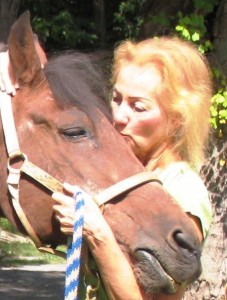President’s Message:
World Farm Animals Day –
Recognizing the Suffering that Farm Animals Endure

It is the one day of the year that recognizes farm animals and the suffering that they endure.
They are known by the majority of people in the world only as breakfast, lunch, and dinner. This being the case, it doesn’t hurt to know what’s behind that “egg and sausage biscuit.”
Years ago, meat animals were raised on family farms, and for the most part they had some quality of life. Today, however, in an effort to satisfy the ever growing human masses, farmers have been driven to what we call factory farming. In this industry, the meat producers try to raise the most animals in the least space possible. Today, too many animals raised for human consumption are confined to small cages or stalls where they are forced to stand for their entire lives on concrete and in darkness. Pigs are often raised in narrow stalls, unable to even turn around. Chickens are often so overcrowded that practices such as searing off their beaks with a hot iron is done routinely to prevent the birds from pecking each other due to stress.
Cattle being transported to slaughter are denied food and water, sometimes for several days; they often slip and are trampled, freeze to death, or succumb to heat exhaustion. They are sometimes so weak that when they arrive at the slaughter house they are unable to walk and these so called “downers” are then dragged into a pile until it is their time to be slaughtered.
Horses are also considered to be a “meat animal.” Most people think that all retired race horses go to some happy place where they live out their lives grazing in green pastures. Well, the truth is places like that care for less than one percent of the horses that are overbred each year for the crippling racing industry. Many of the others end up in livestock auctions where they are bought by Canadian slaughter houses which ship their horse meat to France and other countries for human consumption.
Laws which govern the humane treatment of farm animals are weak — thanks mainly to the all too powerful Farm Bureau. For instance, the “Buster Bill” which made certain aspects of cruelty a felony was strongly opposed by the Farm Bureau, and therefore stood no chance of passing unless the bill was worded so that it did not include farm animals. We can also thank that agency for their stance against a bill mandating that all owned animals would be required to have appropriate shelter.
The farm animal issue goes much farther. For instance, the House of Representatives recently voted against the Defazio-Bass Morella amendment which would have saved U.S. taxpayers seven million dollars that will now be used for “lethal predator management.” In other words, in an effort to satisfy ranchers, our tax money will continue to be used to poison predatory mammals, mainly coyotes. I didn´t vote for that!!
Whether or not we eat animals, we should all be concerned about the way they are treated while they are alive. And, we also need to consider what the effects of antibiotics and other drugs pumped into the animals in this system of mechanized torture called factory farming are having on us.
Susan C. McDonough
President
New York State Humane Association Humane Review, Vol.XIV, No.3, Fall 2000.